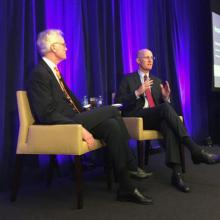switzerland
Critical to the success of the movement is the fact that corporations are not simply tolerating activists such as Daly.
Instead, they increasingly see the socially responsible agenda as good business; and, perhaps more important, so do investment firms that are responding to the growing demand for portfolios that reflect a client’s values while also making money as effectively as any other investment.

(stockillustration / Shutterstock)
AS YOU READ this column, diplomats from the United States, the United Kingdom, France, Russia, China, Germany, and the European Union are working with their Iranian counterparts to finalize a deal concerning Iran’s nuclear program. I strongly believe that Christians should support the framework for this deal, announced in Lausanne, Switzerland, on April 2, as the best chance to prevent Iran from becoming a nuclear-armed state and—equally important—the best chance for the United States to avoid armed conflict with Iran.
In the days following the announcement of this framework, Sojourners authored and published a statement of support, which was signed by more than 50 Christian leaders (see statement here). Part of that statement reads as follows: “It is the sacred responsibility of all those entrusted with political power to pursue, with patient perseverance, every option that makes the destruction of war less possible, in order to protect human life and dignity. This becomes an even more urgent moral and spiritual imperative when we have the chance to prevent the further spread of nuclear weapons, with their terrifying potential of mass destruction ... a goal that reflects the binding commitments made by 191 U.N. member states, including the United States, under the Nuclear Non-Proliferation Treaty (NPT).”
I just returned from Davos, Switzerland, where the annual meeting of the World Economic Forum is held each year. Leaders from business, government, and civil society all gather here to engage each other, make connections, and, hopefully, make progress on the mission statement of the WEF: “Committed to Improving the State of the World.”
I reflected on that mission statement last year in my remarks to all the attendees at the event’s closing session. I said the deeper meaning of leadership is sacrifice and not just skills — and that the most included people on the planet who were sitting in that famous Congress Hall will be morally evaluated by their relationship to the most excluded, who, of course, are never in that grand auditorium. Many individual leaders in attendance wanted to discuss that challenge further, and those conversations continued this year.
One session this year that drew many people off site was called “Struggle for Survival” — an intense simulation of how 3 billion people in our world actually live each day. Half of the global population exists on less than $2 per day. Run by the Crossroads Foundation, Struggle for Survival was a much more emotional experience than the rest of the sessions at Davos.
My wife, Joy, and I participated in this simulation, and the people running it told us that several CEOs seemed quite affected by the very powerful dramatization of real-world injustice and poverty. It took people out of their heads into stunning revelations of how the excluded really live, prompting feelings of guilt, pain, anger, empathy, and compassion — and then a call to commitment.
Listen as Jim Wallis talks to Sojourners CEO Rob Wilson-Black about giving the send-off speech on values at the World Economic Forum, where the pair brushed shoulders with some of the most prominent business minds. Here's a brief look at what Jim was trying to do with his talk:
"The pope reminded us about the excluded. This gathering is the most included gathering in the world. You are the most included people in the global economy. How will the most included reach out to the most excluded and bring them in to the global economy? That's what I want [World Economic Forum attendees] to ask themselves."
We're sorely missing the servant leadership of America's CEOs on matters of corporate taxation.
As Congress contemplates trillions in budget cuts that will worsen poverty and undermine the quality of life in America, consider these findings from a new report that I co-authored, "Massive CEO Rewards for Tax Dodging," by the Institute for Policy Studies.
Last year, the compensation of 25 CEOs at major profitable U.S. companies was larger than the entire amount their company paid in U.S. corporate taxes.
These 25 include the CEOs of Verizon, Boeing, Honeywell, General Electric, International Paper, Prudential, eBay, Bank of New York Mellon, Ford, Motorola, Qwest Communications, Dow Chemical, and Stanley Black and Decker.
- Because I am an evangelical Christian and the root of the word "evangelical" is found in the opening statement of Jesus in Luke 4, where Christ says he has come to bring "good news (

